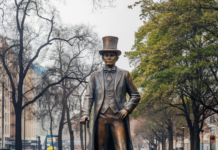Learning about contemporary leaders is crucial for young students as it fosters contextual awareness. By understanding the roles and decisions of today’s prominent figures, students gain insight into the current geopolitical landscape, including ongoing conflicts, alliances, and economic policies. This knowledge helps them stay informed about significant events shaping the world today. Moreover, it promotes a sense of global citizenship, enabling students to grasp international relations and the interconnectedness of countries. This awareness nurtures empathy and responsibility towards global issues, preparing students to be active and informed participants worldwide. Furthermore, it provides college students with high-income skills they can use in their future careers, equipping them with the necessary tools to navigate complex and ever-changing environments effectively. As such, it is important for students to learn about contemporary leaders.
Informed Decision-Making
Learning about contemporary leaders equips young students with the foundation for informed decision-making. As future voters and active participants in democracy, students knowledgeable about current leaders and their policies are better prepared to make informed decisions during elections and engage in civic actions more effectively. This awareness ensures that their choices reflect an understanding of the broader political landscape and the potential impact of their votes. Moreover, comprehending the political environment can significantly influence career choices. Fields such as international relations, public policy, and business often require a firm grasp of current political dynamics, enabling students to pursue careers that align with their interests and contribute meaningfully to society.
College students, even community college students, can reap the benefits of knowing about contemporary leaders. The skills gained from studying today’s prominent figures can help them become effective leaders, whether in their communities or future careers. This knowledge allows students to critically analyze current events and make strategic decisions informed by understanding global dynamics.
Critical Thinking and Analysis

Learning about contemporary leaders is essential for developing young students’ critical thinking and analytical skills. Students learn to critically assess the effectiveness and implications of different decisions by evaluating current figures’ policies and leadership styles. This process fosters their analytical abilities, enabling them to dissect complex issues and understand multiple perspectives. Additionally, knowledge of contemporary leaders and their actions facilitates debates and discussions on pressing issues. Engaging in such discussions enhances students’ ability to argue and reason effectively, promoting a deeper understanding of the topics and preparing them for thoughtful participation in societal discourse.
Role Models and Inspiration
Learning about contemporary leaders provides young students with role models and sources of inspiration. By observing the actions and decisions of today’s prominent figures, students can identify and emulate positive leadership qualities such as resilience, empathy, and strategic thinking. These traits are essential for personal development and leadership in various life aspects. Furthermore, contemporary leaders who advocate for social justice, environmental sustainability, and human rights are powerful examples of social responsibility. Their dedication to these causes can inspire students to pursue similar goals, fostering a generation committed to positively impacting society and the world.
Cultural Competence

Learning about contemporary leaders from various regions and cultures helps young students develop cultural competence. Exposure to diverse perspectives fosters empathy and understanding, essential skills in today’s increasingly globalized world. Students gain insights into the unique challenges and values that shape their actions by studying individuals’ experiences and leadership styles from different cultural backgrounds. Additionally, this knowledge enhances students’ ability to communicate and collaborate effectively with people from diverse backgrounds. Understanding and appreciating cultural differences prepare students for cross-cultural interactions, promoting harmony and cooperation in personal and professional settings.
Future Leadership
Learning about contemporary leaders is crucial in developing future leaders among young students. Students are exposed to effective governance, diplomacy, and leadership examples by studying these figures, which provide valuable lessons and strategies they can emulate. This understanding helps nurture their potential as future leaders capable of making informed and impactful decisions. Observing current leaders’ innovative ideas and solutions inspires students to think creatively and contribute to societal progress. Exposure to such innovation encourages them to seek new ways to address challenges and drive positive change, preparing them to lead with vision and ingenuity.
Top Leaders, You Should Learn About Contemporary
Ursula von der Leyen – President of the European Commission
- Impact: Leading the European Union’s digital transformation and the European Green Deal to make Europe climate-neutral by 2050.
- Lessons: Strategic thinking, commitment to sustainability, and leadership in international policy
Malala Yousafzai – Pakistani Activist for Female Education
- Impact: Survived an assassination attempt by the Taliban and has since become a global advocate for girls’ education.
- Lessons: Courage, the right to education, and advocacy for gender equality
Elon Musk – CEO of SpaceX and Tesla
- Impact: Tesla revolutionized the electric vehicle industry and private space exploration with SpaceX.
- Lessons: Innovation, risk-taking, and long-term vision in business.
Joe Biden – President of the United States
- Impact: Focuses on tackling climate change, economic recovery, and restoring international relations. His administration is also significant for its diversity.
- Lessons: The importance of resilience, diplomacy, and diversity in leadership.
Ngozi Okonjo-Iweala – Director-General of the World Trade Organization
- Impact: First woman and first African to hold the WTO’s top position, she focuses on making global trade more inclusive.
- Lessons: Breaking barriers, perseverance, and global economic policy
Jeff Bezos – Founder of Amazon
- Impact: Transformed e-commerce with Amazon and expanded into cloud computing and space exploration with Blue Origin.
- Lessons: Entrepreneurship, innovation, and scaling businesses.
Satya Nadella – CEO of Microsoft
- Impact: Revitalized Microsoft by focusing on cloud computing and inclusive company culture.
- Lessons: Transformative leadership, fostering innovation, and empathy in business.
Shantanu Narayen – CEO of Adobe
- Impact: Led Adobe’s shift to a cloud-based subscription model, significantly growing the company’s valuation.
- Lessons: Adaptability, customer-centric innovation, and strategic vision.
Tim Cook – CEO of Apple
- Impact: Successfully led Apple after Steve Jobs, focusing on privacy, sustainability, and new product innovations.
- Lessons: Continuity in leadership, ethical business practices, and innovation.
Conclusion
By studying these individuals, students can understand the challenges and opportunities in different fields, ranging from politics and business to environmental activism and technology. Each leader’s unique approach to problem-solving and leadership offers practical examples to inspire and guide students in their journeys.















